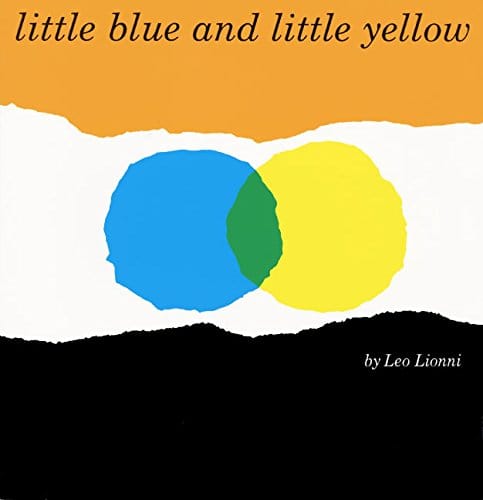Little Blue and Little Yellow

by Leo Lionni
The Story
In this groundbreaking work of children's literature, Little Blue and Little Yellow are best friends who love to play together. One day, they hug each other so tightly that they merge into green. When they return home, neither of their families recognizes them. "You are not our Little Blue," say Blue's parents. "You are not our Little Yellow," say Yellow's parents.
Heartbroken, the two friends cry blue and yellow tears until they separate back into themselves. When their parents finally understand what happened, they too embrace each other and turn green—learning through experience what their children discovered through love.
The Hidden History
What appears to be a simple story about colors and friendship carries a profound historical weight. Created just six months after Leo Lionni's "Unfinished Business" pavilion at the 1958 Brussels World's Fair was shut down by Southern senators for depicting racial integration, this book was Lionni's response to censorship.
The pavilion had featured a photograph of seven racially diverse children playing Ring Around the Rosie. In Little Blue and Little Yellow, seven colored dots play the same game. The message that politicians silenced for adults, Lionni reimagined for children—those who would shape the future.
Purpose and Commitment to Childhood
He believed that "the audience he most wanted to write for was audience who would make the future." His commitment to children wasn't sentimental—it was revolutionary. Unable to address adults about America's "unfinished business" of integration and tolerance, he spoke directly to those who could still be shaped by these values.
His books consistently explore how to:
- Maintain yourself in the face of pressure
- Build community across differences
- Find strength in unity while celebrating individuality
- Transform rejection into understanding
A Living Legacy
Today, Lionni's work continues to spark conversations about friendship, family, identity, and acceptance. That his work has been banned as recently as 2015 (in Venice, for "threatening traditional families") proves that Lionni's "unfinished business" remains unfinished—and his method of addressing it through children's literature remains as powerful and necessary as ever.
A couple other books we read and love in my household:







For the full story behind this book's creation and Leo Lionni's transformation from censored artist to children's book revolutionary, read my post about the Reach Out and Read podcast.







Member discussion